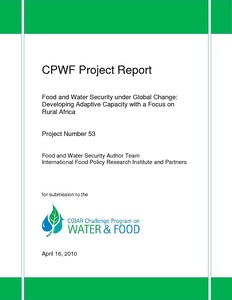Resource information
Food and Water Security under Global Change: Developing Adaptive Capacity
with a Focus on Rural Africa
The project “Food and Water Security under Global Change: Developing Adaptive
Capacity with a Focus on Rural Africa” aimed to provide farmers, policymakers,
and other stakeholders in Ethiopia and South Africa with tools to make better
adaptive decisions in the face of climate-related risk. The project combined
household surveys and stakeholder forums, which examined local perceptions of
the long-term effects of global warming and adaptive responses, with climate
change impact analysis. The results of the study showed that vulnerability to
climate change is dependent on a number of factors including the degree to which
farmers are exposed to climate change, their sensitivity to climate changes, and
their adaptive capacity. Given that the nature of vulnerability will vary depending
on these factors and given large spatial differences across regions, policymakers
should tailor strategies to reduce vulnerability to local conditions. An effective
way to address the impacts of climate change would be to integrate adaptation
measures into sustainable development strategies, thereby reducing the pressure
on natural resources, improving environmental risk management, and increasing
the social wellbeing of the poor. Moreover, early warning of extreme climatic
events, such as droughts and floods, can alert farmers to the shocks, enabling
them to take action to reduce their vulnerability, such as selling livestock and
increasing food stocks. The findings indicate that adaptation strategies need to
go beyond improved water storage, additional irrigation, and new crop varieties
to include a focus on improving farmers’ access to information, credit, and
markets. Information on climate changes and appropriate adaptation responses is
critical to ensure that farmers are able to make the necessary adjustments to
their farming practices. To ensure that the right information gets to the right
people, proactive investments, policies, and extension services must explicitly
target those who are most vulnerable to climate change: subsistence farmers,
women, children, and marginalized or less-educated groups. Additional
investments of US$2 billion per year in public agricultural R&D, rural roads,
female secondary education, irrigation, and access to clean water could
significantly reduce the adverse effects of climate change in Sub-Saharan Africa.
US$5 billion per year could help reduce the number of malnourished children to
one-third of its current level over the next fifty years.


